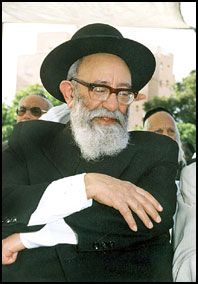A Short Tribute
Mori Yoseph Kapakh, son of Mori David Kapakh, was born on 12 Kislev, 5768 (1917) in Sana'a, Yemen. His grandfather, Mori Yihya Kapakh, was one of Yemen's great sages in his time and one of the founders of Dor De'ah movement, whose members were known as the "Darda'im". They sought to revive the halachic rulings by Maimonides and Rabbi Sa'adia Gaon, which preceded those of the Shulchan Aruch, in their communities; they opposed the study of Kabbala and Zohar and encouraged a broad secular education. The grandfather's activities provoked opposition within the Jewish community, and made the local authorities fear for the regime's stability. The group of scholars was imprisoned and their activities prohibited, but they continued to meet and study Torah. His father, Mori David Kapach, died when Mori Yoseph Kapakh was barely a year old, after being severely beaten by gendarmes at the time of their arrest for studying Torah.
In 1922 Mori Yoseph Kapakh's mother died. The five-year old child was raised by his aunt, Saada Vatshi, and learned Torah from his grandfather, Mori Yihya Kapakh. When his grandfather died in 1931, Mori Yoseph Kapakh took his place and began to give classes at the study house. He continued his studies with Mori Ratsha Tsarum, who had been one of his grandfather's students.
At the age of 16, in 1933, Mori Yoseph Kapakh was also arrested by the authorities. After his release he married Beracha, his young cousin, and the couple had their first son, David, three years later.
In 1943 Mori Yoseph Kapakh immigrated to the Land of Israel. He initially studied at the Merkaz HaRav yeshiva, and then went on to train as a dayan at the Harry Fischel Institute. He was appointed to the Jerusalem Regional Rabbinic Court in 1950 and, in 1970, to the Great Rabbinic Court. Mori Yoseph Kapakh, a member of Israel's Chief Rabbinic Council and President of the Jerusalem Yemenite community, was awarded the Israel Prize for Torah Literature in 1969.
His work in Torah was directed primarily at translating scores of manuscripts by early Sephardi sages to Hebrew, including Amanut VeDe'ot by Rabbi Sa'adia Gaon, Rabbi Yehuda HaLevy's Kuzari, Hovot Halevavot by Rabbenu Bahia Even Pekuda, Rabbi Nathan's commentary on the Six Books of Mishnah, and many other works written in Judeo-Arabic. Maimonides' work holds a unique place in his work: He translated Iggrot HaRambam, the Guide to the Perplexed, the Commentary on the Mishnah, Sepher HaMitzvot and Milot HaHegaion, and wrote an annotated edition of Mishneh Torah, in 24 volumes. The numerous articles he wrote have been collected in his Writings, published in three volumes.
Mori Yoseph Kapakh was deeply involved in Jewish Yemenite heritage and he describes the lives and customs of Yemenite Jewry in his book, Halichot Teiman. He edited the Shivat Tzion Tachlal, the Yemenite siddur prayer book that follows Maimonides' original rite, as well as the Si'akh Yerushalaim siddur.
Mori Yoseph Kapakh passed away on 18 Tammuz, 5770 (2000), and was buried in Jerusalem's Har Hamenukhot cemetery.
